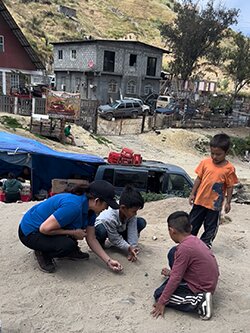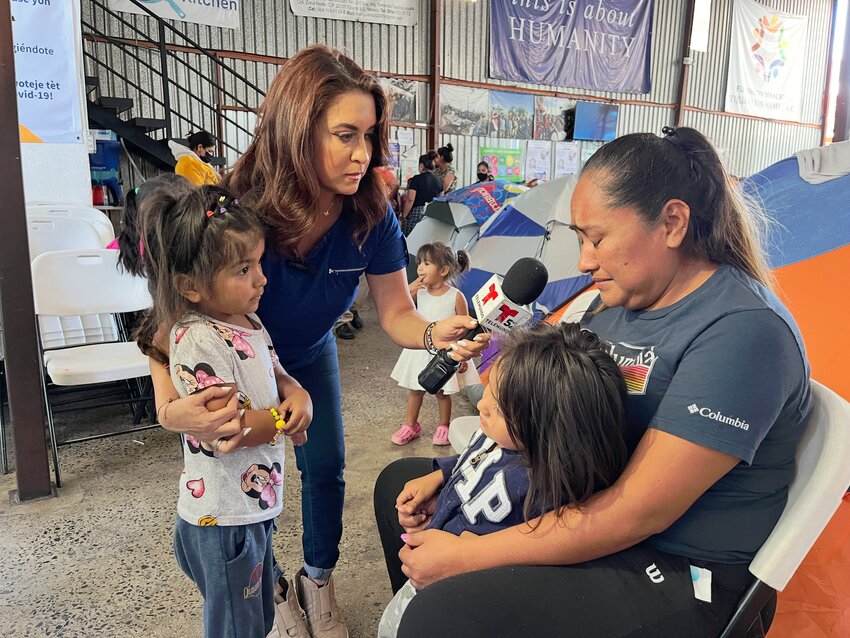Reporting on immigration and deportations
Donald J. Trump, during both his first and current presidential terms, made immigration a cornerstone of his political platform. Under his direction, federal agencies are taking an aggressive stance on immigration enforcement and deportations, even as critics debate the legality and decry the unconstitutionality of his actions.
NBC News has been tracking the impact of these policies with a U.S. Deportation Tracker, which keeps a current tally of arrests, detentions and border crossings. The data shows that ICE deported 11,000 migrants in February and over 12,300 in the first four weeks of March alone. As of May 12, ICE had 48,846 individuals in detention, and 10% of those have been “fast-tracked” for deportation.
Immigration and deportation stories are grand in scope. They are of national and international interest but also keenly hyperlocal. They are stories about individuals, families, local communities and businesses as much as about policy, government and nations. It’s also a beat that’s becoming more challenging in myriad ways, including sourcing and protecting those sources. The work occasionally puts journalists in the sights of regulatory and law-enforcement agencies. For example, in February, KQED’s Juan Carlos Lara reported that the Federal Communications Commission (FCC) had launched an investigation into KCBS, a San Francisco radio station, because of the station’s live reporting on ICE activities in the city. Lara explained, “First Amendment advocates worry the FCC investigation will have a chilling effect on news organizations reporting on the Trump Administration’s mass deportation plans.”
On the immigration beat
Nick Miroff got his first professional break when he was a student at UC Berkeley’s journalism school. “The legendary Washington Post editor, recruiter and all-around mensch, Tom Wilkinson, came out to do annual interviews with second-year students as prospective interns,” Miroff said. Miroff made the cut, and in the summer of 2006, The Post assigned him to the Prince William County Bureau in northern Virginia.
“It was an incredible time to be there. The D.C. metro area was booming, with all the post-911 national security interests and defense spending. And in Prince William County, developers were buying up farmland and building subdivisions like crazy,” Miroff recalled. Fluent in Spanish, he reported on the Central American workers who were building the housing, many of them undocumented. It laid the foundation for his long career covering immigration.
After three years as the metro reporter, Miroff traveled abroad as a Latin America correspondent. It was during the height of the Mexican drug wars, and he and William Booth, an international correspondent for The Post, teamed up to report on the violence unfolding there. Subsequently, he worked throughout Latin America and the Caribbean before returning to D.C. in 2017, when he began covering the Trump Administration’s immigration policies and the Department of Homeland Security.
It was a new challenge for Miroff, who had to build relationships with insider sources at federal agencies. He held that role throughout the first Trump administration and Joe Biden’s term. After 18 years at The Washington Post, Miroff made a leap to The Atlantic, where he’s a staff writer.
“During the first [Trump] administration, it felt like the government was doing extraordinary things. It was pushing the boundaries of the law, like separating children from their parents at the border,” Miroff said. “Now, they’re just doing more of it.”
Though the beat is familiar, Miroff said he finds the news magazine style and pace refreshing. He still produces breaking news in timely moments.
“The Kilmar Abrego Garcia story was one that we were able to break, because I immediately recognized that there was a story when the government filed on the evening of March 31st. I saw that the government admitted to deporting this man in error. I knew the significance of that, and it was a big deal. I could jump on it and give it the attention it deserved,” Miroff said.
Reporting on immigration and deportations is a vast landscape, even for entire teams of reporters. Miroff largely works solo but sees the opportunity for future collaborations. Asked how he decides what stories to pursue, he explained, “I only want to do something if it’s unique and gives our readers something they won’t be able to get anywhere else. I’ll give you an example. … Yesterday morning, we saw that this flight of South African refugees was landing at Dulles. Here’s a story that other reporters are obviously going to be covering. But I’m here in Washington, and I thought maybe there’s something I can add to the coverage. So, I went,” Miroff said.
The State Department denied Miroff access to the presser they held in conjunction with the arrivals. They turned him away despite his credentials, but his instincts told him to wait outside for a while. After the government officials packed up and left, some of the South African refugees came outside for a smoke, and Miroff got a coveted, exclusive interview.
“If I had not succeeded in talking to them, I would not have written a story. … I was able to bring some additional value to the story, and it was worth writing,” Miroff said.
Asked about the challenges he’s faced on this beat, Miroff cited sourcing and a growing demand for insight into First Amendment protections and Constitutional law — in vigorous debate among lawmakers. He can turn to expert legal sources for those questions, but the more formidable challenge is sourcing. He observed that the Trump administration has instilled a culture of fear in federal agencies.
“People who I have long-standing relationships with are terrified to talk,” he said. He explained that these are not conversations about national security or sensitive classified information. Many are simply career public servants who can explain procedures and how a government agency works.
“This climate of fear is bad for journalism. It’s bad for democracy. It’s bad for the federal government. It’s just in bad faith,” he said.
Insider sources are also more fearful of having their communication devices seized. It has made getting sources — and protecting those sources — measurably more difficult.
Miroff has been more actively soliciting whistleblowers. He publishes his Signal handle now, and that’s been effective for tips. “We may gain a few whistleblowers, but we’re losing long-time lunch-pail sources who are so important,” he said.
Miroff appreciates data but keeps his reporting grounded — focused on people more than mere statistics.
“As a Spanish speaker, I’ve had the luxury of being able to speak directly with immigrants without the filter of a lawyer or an advocacy group to reach them,” he said. “It’s important for me to go to the border periodically and be in immigrant communities.”
A support system for journalists covering immigration
Dunia Elvir is the president of the National Association of Hispanic Journalists (NAHJ), an award-winning journalist and a news anchor at Telemundo in Los Angeles. (Photo credit: Telemundo KVEA52)
Dunia Elvir was born in Honduras and immigrated to the United States as a teenager. She was undocumented during those formative years, and throughout her long and award-winning work as a broadcast journalist, her reporting on immigration was partly informed by her personal experience coming to this country, speaking very little English, and having to navigate her educational and professional paths — and her path to citizenship.
Throughout her decades-long career, she’s worked in print and broadcast. She was hired by Telemundo in 1990. She worked in audio, behind the camera, in the graphics department, and by chance, found her best talents were in front of the camera.
“Something really bad happened. There was an explosion at a meth lab in Huntington Park, and I was the only one in the studio to report on it. That was my first story on air,” she said. Her work has taken her from coast to coast and into Latin American countries. She’s covered major immigration moments, like the million-person march in Los Angeles in 2006, a protest about the failure of Congress to pass the Comprehensive Immigration Reform Act.

Dunia Elvir’s reporting on immigration and deportations has taken her coast to coast, across the United States and into Latin America. Here, she spent time with children at a shelter in Tijuana. Some children were alone, without adult guardians or parents to protect and guide them. (Photo credit: Photojournalist Fernando Escamilla)

Dunia Elvir reported on Title 42 from the U.S. side of the border wall. (Photo credit: Photojournalist Fernando Escamilla)
Last year, Elvir was elected president of the National Association of Hispanic Journalists (NAHJ). She spoke with E&P from her position leading the organization, which has been a support system throughout her career. She attended her first NAHJ conference in 2004.
“I experienced the family bond,” she said. Her peers were a source of inspiration and counsel. As president, she wants to support aspiring journalists in kind. NAHJ has proactively provided tools and continuing education for reporters covering immigration.
Elvir said it’s critical that journalists get the stories right and that they are thorough and fair — to the undocumented immigrants at the center of the story and to the law enforcement agents.
Because of her own long career covering immigration and her personal experience being undocumented, Elvir said the U.S. immigration system is “broken,” and it’s been that way for decades.

On May 8, 2023, Journalist and Anchor Dunia Elvir traveled to a Tijuana shelter and interviewed a mother who was preparing to cross the border. (Photo credit: Photojournalist Fernando Escamilla)
The tone of the political rhetoric may be more contentious and dangerous, but politicians from both sides of the aisle have essentially debated the same issues since the 1990s. Elvir sees that as a self-inflicted impasse — a lack of political courage to find common-ground solutions.
Data and statistics can be a critical part of the immigration-reporter job. It often provides context. Elvir offered an example: She recently inquired about the number of undocumented immigrants from Honduras who have been deported by the Trump administration this year. She found the numbers to be similar to those of the same period last year under the Biden administration.
Asked about the immigration and deportation questions she and other journalists hear on this beat, Elvir said, “Hispanic journalists, in general, hear a lot from people who have concerns about family separation. Or they’ll ask, ‘I have a green card and want to travel to Mexico, but can I come back?’ … That is a new concern.”
 Gretchen A. Peck is a contributing editor to Editor & Publisher. She’s reported for E&P since 2010 and welcomes comments at gretchenapeck@gmail.com.
Gretchen A. Peck is a contributing editor to Editor & Publisher. She’s reported for E&P since 2010 and welcomes comments at gretchenapeck@gmail.com.
